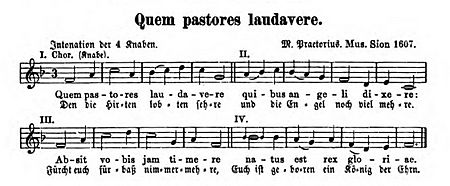Quempas facts for kids
Quick facts for kids "Quempas" |
|
|---|---|
| Christmas carol | |
 |
|
| English | "He whom the shepherds praised" |
| Full title | "Quem pastores laudavere" |
| Genre | Christmas carol |
| Language | Latin |
Quempas is the short name for a very old Latin Christmas carol called "Quem pastores laudavere." This means "He whom the shepherds praised." It was very popular in Germany during the 1500s.
Sometimes, "Quempas" is also used as a general term for Christmas songs. These songs were part of a special German tradition of singing carols. "Quempas" is also the name of an early way of singing carols. It is also the name of a collection of old carols. This collection was first published by Bärenreiter in 1930.
The Story of Quempas
The very first records of this carol are from the 1400s. One of the oldest copies is from the Hohenfurth Monastery in 1410. Many different versions of the song appeared in the 1500s.
The most famous version was created by Michael Praetorius in 1607. It was part of his collection called Musae Sioniae. This version included German words: "Den die Hirten lobeten sehre."
The first part of the song in Latin goes like this:
| Quem pastores laudavere, quibus angeli dixere, absit vobis jam timere, natus est rex gloriæ. |
He whom the shepherds praised, to whom the angels sang: Now lay aside your fears, the king of glory is born. |
Quempas Singing Tradition
Students from Latin schools kept a tradition called "Quempas singen." They would go from house to house, singing carols. By doing this, they would earn money to help support themselves or their schools.
In the 1900s, some people wanted to bring back the "Quempas singen" tradition. They also wanted to move away from the very emotional Christmas carols of the 1800s. So, Wilhelm Thomas and Konrad Ameln published a collection of old carols. They called it Quempas, or sometimes Quempas-Heft. The publisher was Bärenreiter.
The first collection had 39 songs with their melodies. Later, they released versions for choirs to sing. In 1962, they added even more songs, including some from the 1900s. A newer collection, Der neue Quempas, came out in 2012 with 41 songs.
The carol is also in a British collection called Carols for Choirs (Volume 2, 1970). This version was arranged by John Rutter. It uses the original Latin words with an English translation by Imogen Holst.
 | Laphonza Butler |
 | Daisy Bates |
 | Elizabeth Piper Ensley |

